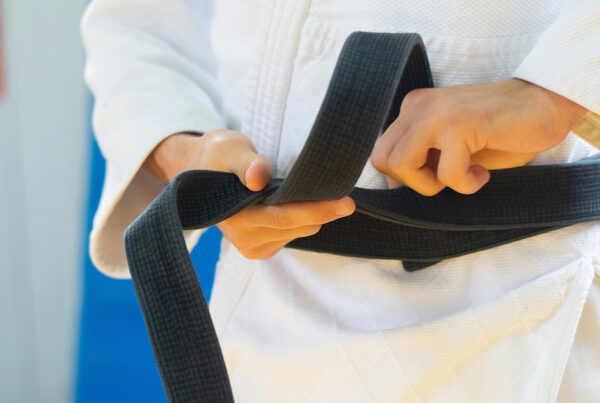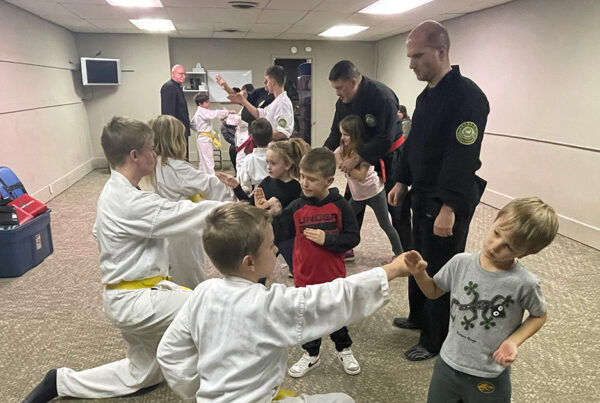Martial arts competitions are a great way to test your skills against all kinds of competitors.
Each and every person has invested time, money, and likely travel to get to tournament day.
So, how can you have the best experience?
Make the most of your next competition with these 11 tips!
1. Pack Your Gear The Day Before You Leave
You should have gear already.
You’ve already got a uniform, and you should have any sparring gear or weapons you’ll need.
After all, the tournament director has posted their required equipment ahead of time, so you should have purchased it already.
Tournaments often require travel, so don’t rush things when you leave either the morning of or the day before a tournament.
Some typical things to include in your gear bag:
- Uniform + belt.
- Sparring equipment.
- Weapons you’ll compete with
- At least two T-shirts and pairs of socks, so you have clean clothes for the ride home.
- A towel to help you dry off and to have some privacy when you change, in case all you get is a bathroom.
- Body wipes.
- Hand sanitizer.
- A first aid kit (medical personnel are often on hand with the necessary equipment, but it may not hurt to have a backup in your bag or the car).
2. Eat A Good Breakfast
We’ve all heard that “Breakfast is the most important meal of the day.”
That’s because it’s largely true.
According to Cleveland Clinic, breakfast helps reduce brain fog and energize you for the day, both of which are beneficial for a day-long martial arts tournament.
3. Arrive When The Tournament Starts
Tournaments usually always start on time, but the schedule may change throughout the day.
While it’s generally recommended to arrive an hour before your division starts, I recommend arriving before the tournament even begins.
Why?
Oftentimes, tournaments get a bad rap for running behind.
However, tournaments often run ahead of schedule.
If a competitor’s event is supposed to begin at 11:30, and they arrive at 10:30, that division might have started at 10:00 and be over already.
We’ve had a few students experience this exact circumstance, so I recommend arriving at the starting time.
Plus, arriving early helps you cheer on students from your school, calm your pre-competition nerves, and get a feel for fellow competitors.
4. Bring Cash
It’s always a good idea to bring extra cash for a few reasons.
First, spectators—parents, grandparents, and other family members and friends—are usually charged an entry fee.
Second, concessions are usually available on site, and you usually can’t bring food or drinks into the venue.
Bring enough cash to help you cover those expenses.
Finally, vendors may also have event T-shirts or merchandise for sale.
Save yourself or the small business selling the merchandise a credit card processing fee by bringing cash when your child begs for a shirt or other souvenir.
5. Use Manners
You may or may not already do this in your school or at home.
Although not required, tournament officials appreciate when competitors use manners like:
- Yes, sir.
- Yes, ma’am
- No, sir.
- No, ma’am.
- Thank you, sir.
- Thank you, ma’am.
If you’re nervous and you forget, that’s okay.
6. Practice Throughout The Day
Tournament days involve a lot of sitting around doing nothing.
Several times throughout the day, spark your brain and move your body by practicing your forms and getting a few rounds of light sparring work in.
If you know your division will be called within the next 30-60 minutes, spend some time…
- Doing light warm-ups like jumping jacks, high knees, butt kicks, and stretching).
- Practicing your form, or certain sections of it.
- Doing some light shadow sparring.
- Performing pad drills if you have someone who’s able to help you out like a parent or coach.
Usually, forms divisions will be called first, which helps warm you up for the sparring competition that is often soon to follow.
7. Listen For Your Name Or Division
This applies to parents, competitors, and coaches.
Some time long before you arrived at the event, tournament organizers likely started to group competitors into divisions of similar age, size, and gender.
When divisions are ready, they may be called to a staging area.
From the staging area, competitors are assigned to a ring.
Sometimes, competitors may be moved to another ring based on judges’ availability or some other factor.
Regardless, once the competitor leaves the staging area, they should stay with their division until or unless a tournament official tells them differently.
It’s your responsibility to let your ring officials know who you are—they might not know who you are, so you need to let them know you’re ready for action.
Listening for names and divisions may be challenging because there is a lot going on at a tournament, but it’s crucial that competitors are where they need to be when their division is called to compete.
Not being ready means a competitor may miss their division and either:
- Not being able to compete, which is a waste of money and time spent practicing.
- Having to perform in their own division, meaning they may receive a 1st-place award when they may otherwise have received a 3rd in a division of 4, for example.
Students, parents, and coaches (to a lesser extent) are responsible for making sure competitors are in the right division at the right ring at the right time.
Please be patient with your coach—we’re usually performing several functions at a tournament, from a volunteer official to a hype person to filling in whatever gaps to help the event run smoothly.
If you’re a parent and competitor and are not sure where you should be, ask someone who looks like they know what they’re doing—chances are they’ll know who to talk to.
8. Don’t Distract The Judges
Judges often have no responsibility in setting up divisions.
This process is usually completed in the staging area.
By the time a division gets to a ring, the judges’ sole responsibility is to run the formalities involved in the competition and not to assign divisions.
Parents & competitors: please do not distract the judges by asking about where your child is supposed to be or why your child hasn’t been called.
They often don’t know because that is not a process they were involved with.
Districting the judges can affect scoring for other competitors, which isn’t fair to them.
Again, if you have questions, please get in touch with your instructor, a staging director, the tournament director, or another black belt who isn’t actively working the floor.
Further, if a judge makes a decision you disagree with, please ask for clarification.
Judges are often happy to help parents—who are rightfully advocating for their child but usually don’t understand how judging works—understand the judging process.
Converse, don’t confront.
It can be easy to be heated in the moment, but that is often perceived by judges as disrespect, and won’t go over well with judges who are tired, hungry, haven’t had a bathroom break in awhile, and have fielded potentially dozens of angry parents throughout the day.
9. Stay Seated As Much As You Can
As a parent and coach, you want to see your athlete compete.
However, please be mindful that so does every other parent, coach, and athlete from the same team.
If you are not specifically assigned to a competitor for coaching (say, in a sparring competition), please stay seated.
Let the other spectators…
- Soak in the action firsthand.
- Get that photo they’ll talk about for days, weeks, and maybe years following the event.
- See the judges score in real time.
10. Athletes: Shake Hands
When you watch a sporting event like football or basketball, you’ll see opponents and coaches from opposite teams shake hands.
Karate and taekwondo are no different than basketball, football, or any other team sport.
When your division is finished, shake hands with:
- The judges who helped score your division.
- The center referee who tried their best to keep you and your opponent safe.
- Your fellow competitors, even if they scored higher or lower than you.
- Your opponent’s coach, in sparring competition.
One of the foundations of martial arts is respect.
“Karate begins and ends with respect,” is a phrase we often use.
11. Have Fun. Learn something. Make New Friends.
Competition is supposed to be a safe environment to learn something new.
No matter your experience as a competitor, you should learn something following an event.
- If you placed first, understand what worked well for you that day. Maybe your balance was on point, you had incredible focus, or the techniques you drilled for weeks worked. Keep doing whatever you believe propelled you to win.
- If you didn’t win first, understand why. For forms or weapons, ask the judges what you could’ve done to take first. They’ll respectfully tell you what they saw. For sparring, find out your weak areas.
- Make new friends. Tell someone what you liked about what they did. Let them know you saw how hard they tried, no matter their place. Ask them if they’d like feedback and offer something constructive. Then, when you see them a few months or a year from now at the next event, catch up and say hi.
There’s a lot here, but this will help you get the most out of your next tournament experience!




